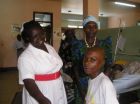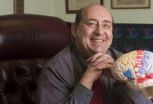(Press-News.org)
INFORMATION:
Research in Boston University’s Center for Space Physics involves interdisciplinary projects between members of the Astronomy Department in the College of Arts and Sciences and faculty, staff and students in the College of Engineering. Research areas include observational and theoretical studies in atmospheric, ionospheric and magnetospheric physics, planetary and cometary atmospheres, solar and heliospheric physics, and space weather.
Founded in 1839, Boston University is an internationally recognized private research university with more than 30,000 students participating in undergraduate, graduate, and professional programs. As Boston University’s largest academic division, the College and Graduate School of Arts & Sciences is the heart of the BU experience, creating an extensive global reach that enhances the University’s reputation for teaching and research.
IMAGES
Figure 1: Image shows examples of the very long tails of sodium escaping from Mercury. These images were taken at the Boston University Station at the McDonald Observatory, run by the University of Texas in Austin. Reference: Orbital Effects on Mercury's Escaping Sodium Exosphere, Carl Schmidt, Jody Wilson, Jeffrey Baumgardner and Michael Mendillo, ICARUS, 2010.
Figure 2: A schematic representation of the viewing geometry that allows the STEREO camera systems to make observations of Mercury's tail.
Figure 3: An image of Mercury's tail obtained from combining a full day of data from a camera aboard the STEREO-A spacecraft. The reflected sunlight off the planet's surface results in a type of over-exposure that causes Mercury to appear much larger than its actual size. The tail-like structure extending anti-sunward from the planet is visible over several days and spans an angular size exceeding that of a full Moon in the night sky.
Figure 4: A movie showing a 4 day period when Mercury tail was visible from the STEREO A spacecraft on 6-9 February 2008.
ADDITIONAL INFORMATION
Boston University Center For Space Physics
Research in Boston University's Center for Space Physics involves interdisciplinary projects between members of the Astronomy Department in the College of Arts and Sciences and faculty, staff and students in the College of Engineering. Research areas include observational and theoretical studies in atmospheric, ionospheric and magnetospheric physics, planetary and cometary atmospheres, solar and heliospheric physics, and space weather.
Founded in 1839, Boston University is an internationally recognized institution of higher education and research. With more than 30,000 students, it is the fourth largest independent university in the United States. It contains 17 colleges and schools along with a number of multi-disciplinary centers and institutes which are central to the university's research and teaching mission
European Planetary Science Congress (Epsc) 2010
EPSC 2010 is organised by Europlanet, a Research Infrastructure funded under the European Commission's Framework 7 Programme, in association with the European Geosciences Union, with the support of the Italian National Institute for Astrophysics (INAF) and the INAF Institute of Physics of Interplanetary Science (IFSI) in Rome. EPSC is the major meeting in Europe for planetary scientists. The 2010 programme comprises 48 sessions and workshops covering a wide range of planetary topics.
EPSC 2010 is taking place at the Angelicum Center – Pontifical University of St. Thomas Aquinas, Rome, Italy from Sunday 19 September to Friday 24 September 2010.
For further details, see the meeting website: http://meetings.copernicus.org/epsc2010/
Europlanet Research Infrastructure (RI)
Europlanet Research RI is a major (€6 million) programme co-funded by the European Union under the Seventh Framework Programme of the European Commission.
Europlanet RI brings together the European planetary science community through a range of Networking Activities, aimed at fostering a culture of cooperation in the field of planetary sciences, Transnational Access Activities, providing European researchers with access to a range of laboratory and field site facilities tailored to the needs of planetary research, as well as on-line access to the available planetary science data, information and software tools, through the Integrated and Distributed Information Service. These programmes are underpinned by Joint Research Activities, which are developing and improving the facilities, models, software tools and services offered by Europlanet.
Europlanet Project website: http://www.europlanet-ri.eu/
Europlanet Outreach/Media website: http://www.europlanet-eu.org/
CONTACTS
Michael Mendillo, professor of astronomy
Center for Space Physics, Boston University
Phone: +39 06 4891 3093
Email: mendillo@bu.edu
Carl Schmidt, graduate researcher
Center for Space Physics, Boston University
Phone: +1 617 353-5990
E-mail: schmidtc@bu.edu
Patrick Farrell, Communications Director
College of Arts & Sciences, Boston University
Phone: +1 617 358-1185; cell: +1 617-543-6480
E-mail: pmfarrel@bu.edu
Eleni Chatzichristou
Europlanet Press Officer
Phone: +30 697 2235681
E-mail: eleni.chatzichristou@europlanet-eu.org
Anita Heward
Europlanet Press Officer
E-mail : anita.heward@europlanet-eu.org
Livia Giacomini
INAF contact at Europlanet Press Office
E-mail: livia.giacomini@ifsi-roma.inaf.it
Mercury found to have comet-like appearance by satellites looking at sun
2010-09-22
ELSE PRESS RELEASES FROM THIS DATE:
Albert Einstein College of Medicine researcher to brief Congressional staffers on global diabetes
2010-09-22
September 22, 2010 – (BRONX, NY) On Monday, September 27, researchers from Albert Einstein College of Medicine of Yeshiva University will hold a congressional briefing in Washington, D.C., aimed at focusing attention on the alarming global diabetes epidemic. Incidence of diabetes is increasing worldwide at a rate that eclipses most other diseases. The World Health Organization estimates that by the year 2030, more than 366 million people will be suffering from diabetes, 10 times the number affected by HIV/AIDS. Of that 366 million, more than 298 million will live in ...
The psychology of financial decision making and economic crises
2010-09-22
How could the current financial crisis have happened? While fingers have been pointing to greedy banks, subprime-loan officers, and sloppy credit card practices, these are not the only contributors to the economic downturn. A new report in Psychological Science in the Public Interest, a journal of the Association for Psychological Science, examines the psychology of financial decision making, including the role of risk in making economic choices, how individuals behave in stock and credit markets, and how financial crises impact people's well-being.
Risk taking is a ...
Taste genes predict tooth decay
2010-09-22
Alexandria, Va., USA – Dental caries is a highly prevalent disease that is disproportionately distributed in the population. Caries occurrence and progression is known to be influenced by a complex interplay of both environmental and genetic factors, with numerous contributing factors having been identified including bacterial flora, dietary habits, fluoride exposure, oral hygiene, salivary flow, salivary composition, and tooth structure. Previous reports have characterized the influence of the genetic variation on taste preferences and dietary habits.
In an article ...
Mayo Clinic finds inflammation causes some postsurgical neuropathies
2010-09-22
ROCHESTER, Minn. -- A new Mayo Clinic study found that nerve inflammation may cause the pain, numbness and weakness following surgical procedures that is known as postsurgical neuropathy. The development of postsurgical neuropathies is typically attributed to compression or stretching of nerves during surgery. This new research shows that, in some cases, the neuropathy is actually caused by the immune system attacking the nerves and is potentially treatable with immunosuppressive drugs. The study was published in this month's issue of Brain.
Postsurgical neuropathy is ...
Cocaine and ecstasy detected in waters of the L'Albufera in Valencia
2010-09-22
The water in the canals and irrigation channels in the L'Albufera Natural Park in Valencia contain cocaine, ecstasy and a further six drugs. This has been confirmed by a study carried out by researchers from the University of Valencia (UV), who have issued a warning about the continued presence of these substances on wildlife and human health.
"The results confirm the presence of drugs such as cocaine, amphetamines, codeine, morphine and cannabis in the surface waters of the L'Albufera National Park at levels ranging between 0.06 and 78.78 nanograms/litre", Yolanda Picó, ...
IVF does not negatively affect academic achievement
2010-09-22
Children conceived by in vitro fertilization (IVF) perform at least as well as their peers on academic tests at all ages from grade 3 to 12, according to a new University of Iowa study.
In fact, the study, published in the October issue of the journal Human Reproduction, found that children who were conceived by IVF actually scored better than age- and gender-matched peers on the Iowa Test of Basic Skills and the Iowa Test for Educational Development (ITBS/ED).
"Our findings are reassuring for clinicians and patients as they suggest that being conceived through IVF ...
New drug could help stop the spread of disease during cough: U of A research
2010-09-22
What if there was a drug that could completely eliminate airborne disease transmission that occurs when someone coughs? Researchers at the University of Alberta believe they have found a way to achieve this.
The idea behind this work came from Malcolm King and his research associate Gustavo Zayas, who work in the Division of Pulmonary Medicine at the U of A's Faculty of Medicine & Dentistry. King and Zayas developed a drug that, when inhaled, would reduce or eliminate the amount of droplets, called bioaerosol, coming out of the mouth when a disease-infected person coughs. ...
Toward the first nose drops to treat brain cancer
2010-09-22
Scientists are reporting the development and successful initial testing of a new form of methotrexate — the mainstay anticancer drug — designed to be given as nose drops rather than injected. It shows promise as a more effective treatment for brain cancer, they say. The report appears in ACS' Molecular Pharmaceutics, a bi-monthly journal.
Tomotaka Shingaki and colleagues note that brain cancer is difficult to treat, partly because current anticancer drugs have difficulty reaching the brain. That's because the so-called blood-brain barrier (a protective layer of cells ...
Talking while walking puts Parkinson's patients at risk for falls
2010-09-22
We've all heard the saying about people who can't walk and chew gum at the same time, but it turns out that walking and talking is difficult enough, especially for people with Parkinson's disease who are at increased risk for falls with injury.
A new Florida State University study found that older adults with Parkinson's disease altered their gait — stride length, step velocity and the time they spent stabilizing on two feet — when asked to perform increasingly difficult verbal tasks while walking. But the real surprise was that even older adults without a neurological ...
Ingredient in soap points toward new drugs for infection that affects 2 billion
2010-09-22
The antibacterial ingredient in some soaps, toothpastes, odor-fighting socks, and even computer keyboards is pointing scientists toward a long-sought new treatment for a parasitic disease that affects almost two billion people. Their report on how triclosan became the guiding light for future development of drugs for toxoplasmosis appears in ACS' monthly Journal of Medicinal Chemistry.
In the study, Rima McLeod and colleagues point out that toxoplasmosis is one of the world's most common parasitic infections, affecting about one-third of the world population, including ...



